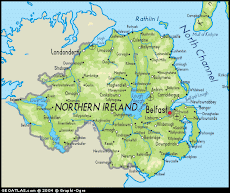Advent. To wait. To have patience. As my friend and fellow YAV, Josh Orem put it, ‘waitience.’ Good word. I think I’ll steal it. For the church it’s a time of wreaths bedecked with purple, pink and white candles; carols and carol services; Nativity plays produced by Sunday School classes and youth groups (some more modern and unique than others;) and even Christmas trees in the sanctuary. Fortunately, of all the differences between the PC(USA) and the PCI, Advent traditions are not really one of them. The candles on the Advent wreath are still lit every Sunday leading up to the 25th, the congregation still belts out carols as though their lives depended on it, and the Nativity story never will have a straight dress rehearsal.
(‘And this time we’ll go right straight through without stopping,’ Mother said sounding sort-of hopeless…. Well, we never did go right straight through without stopping. The baby angels kept forgetting when to come in, half the angel choir sang ‘Away in a Manger’ while the other half sang ‘Oh Little Town of Bethlehem,’ the shepherds didn’t come in at all for fear of Gladys, and Imogene couldn’t find the doll we used as the Baby Jesus so she wrapped up a great big flower urn in the blanket and then dropped it on Ralph’s foot. –from The Best Christmas Pageant Ever by Barbara Robinson. If you’ve never read this book, run out and buy a copy! Reading it will become a new tradition. This isn’t quite our Nativity, but it’s not far off.) Anyway, I digress…
Among all the similar traditions, are the new ones, too. The words to many of the carols are different while the tune is the same, and sometimes the words are the same while the tune is different. It’s interesting to learn. (I recently found out that the Catholics have the same words to many of the Christmas carols that I grew up with. I don’t know for sure, but this would make sense of why the Presbyterian and Methodist—and other Protestant denomination’s—words are different.) And then there are the carols I’ve just never heard before. Each Sunday offers something new.
So amidst all the similarities and differences of Advent abroad, I’ve been thinking about what Advent means. Sure it’s all the ‘usual’ things of waiting and wondering and expecting and ‘waitience,’ but it’s more than that, too, isn’t it? Here, just as in the States, Advent is a time of shopping, wrapping presents, baking cookies, sending cards, decorating the house, festooning the tree, making phone calls to old friends who, for some reason, you only talk to once a year. It’s hustle and bustle and house visits and panicking when you realize that you have no idea how to make this dish with the ingredients you have and your crap-shoot oven and it just won’t be Christmas without it! Or maybe that last one’s just me. Regardless, Advent remains a time that to most of the world is swallowed by commercialism and even for Christians teeters perilously close the edge of falling completely into the capitalized market and ceasing to be the time of worshipful wonderment it’s meant to be.
The other day I was at the Christmas lunch for one of the groups I work with. All the members of the group had brought in a small present for a secret Santa-type gift exchange. All the members, that is, except me. I was unaware of the exchange so I didn’t know to bring anything in, and in this game if you didn’t bring a present you couldn’t participate. I’ve played these types of games before, so I quickly began racking my brain for something that I could offer for this gift exchange that a) I could put my hands on in 60 seconds or less, and b) wouldn’t cost me much of my small stipend. I soon landed upon the option of cookies. Everyone likes Christmas cookies, especially homemade ones, so I quickly made a ‘voucher’ for a batch of ‘homemade American Christmas cookies.’ Satisfied, I put my gift under the tree and joined the game. The lady who picked my envelope was pleased enough with the prospect of getting homemade cookies and thanked me. No problem. As we were cleaning up, though, someone else in the group quietly pulled me to the side.
‘You know that present you put it? It’s nice and all, but that’s just not how we do things here. We each put in about £5 for something small, so that way we all have something. See, she just doesn’t have anything like everyone else. Is that okay?’ Needless to say I was floored by this comment and was so taken aback I couldn’t think of anything really to say.
‘Oh. I’m sorry. I didn’t know,’ I said. And then, being slightly snotty I added, ‘Would you like me to go out and buy her something now?’
‘Oh no, just bring in something after Christmas when we meet again. That way she’ll have something.’
Right. I fought the urge to cry, first, and then fought the urge to smack this lady in the face and scream, ‘I’m sorry I just offered everything I had! How dare you imply that my cookies aren’t good enough! You didn’t even get them!’ It was only on my way home that I thought up all the truly snarky comments I wanted to say and then moved on to the things I maybe should have said, fighting tears the whole way home. But after the sadness subsided and the anger boiled away, I was left with despair at the thought that this is all Christmas is to some people: how much you spend on a gift that the person you’re giving it to may or may not want in the first place. What has happened?
Advent should not be a time of comparing how much you spend or the quantity of the gifts or the places you get your gift cards from. A local television advertising campaign for a store here is ‘Christmas wouldn’t be Christmas without…’ and then celebrities fill in the blank. (I guess they’re celebrities, although I don’t recognize any of them.) With very few exceptions the ‘…’ is always stuff. A thing. A food. A wine. An outfit. Obviously, this store wants you to buy all your own ‘…’ from them, so ‘Christmas wouldn’t be Christmas without [this store.]’ It’s excellent marketing, but lousy theology.
I admit that I am a glutton for the Advent commercialism, and I’m not saying that buying presents is bad and getting things for people is all wrong. After all, we give presents as a way to demonstrate our love for those we give the presents to. But we—I—must remember that behind all the presents, all the wrapping paper, all the cards and candy and trees and lights and carols and cookies and parties and the endless amounts of food is the worship. The worship of the One who came that night and wasn’t offered anything more than what he needed. There were no dinky £5 gift exchanges; all the shepherds had were their sheep and themselves. All the innkeeper had was a stable. All Mary and Joseph had was a blanket and a feed trough in a barn. Even the wise men on their camels only brought one gift apiece and then offered the ultimate gift of not returning to Herod.
I’ve become a fan of the Advent Conspiracy which points all this out in artistically stark ways. I’ve been convicted of my own commercialism. This doesn’t mean I won’t buy presents anymore, (because I love the look on people’s faces when I get them something they really appreciate) but it does mean that as I stuffed by Christmas cards in the mail yesterday I was painfully aware that the same money I spent on postage could have fed a starving child or clothed a homeless man or provided shelter for a battered woman.
As Advent comes to a close and Christmas Day draws nearer and nearer, I want to sit with ‘waitence’ and wonder at Christ. I want to remember to worship the One who came to earth. I want to revel and recognize the blessings God has given me. And I want to invite you to do the same. Put away the wrapping paper, step away from the kitchen, even turn off the lights on the tree just for a second, and remember the One who came with so very little and gave so very much.
Merry Christmas.


No comments:
Post a Comment